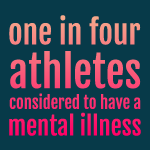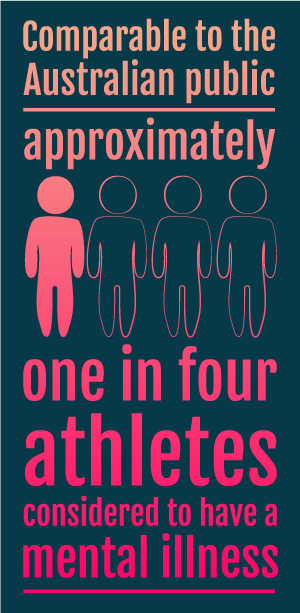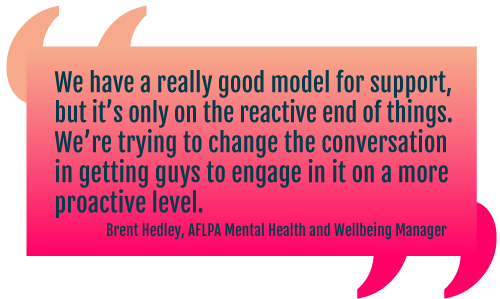Kicking goals for mental health in AFL

The AFL Player’s Association (AFLPA) consider themselves leaders in the Australian sporting industry as a representative body for professional AFL players, whether they are male or female, currently playing or formerly played. Over the past 44 years the AFLPA has strongly advocated for AFL players and the broader community, contributing to many key milestones, like negotiating Collective Bargaining Agreements, and officially representing female AFL players ahead of the inaugural AFL women’s competition in 2016. Their contributions to the development of the game are significant, but it is their work on mental health and general wellbeing which elevates them to what many perceive as a leader among player associations.
 There is a misconception that athletes are less susceptible to mental illness because they are seen as resilient and strong in their professional lives, or because of the wealthy, celebrity lifestyle that is assumed to come with being an athlete. However, a 2015 study of 224 Australian athletes found that the prevalence of common mental health disorders among them was comparable to the Australian public, with approximately one in four athletes considered to have a mental illness. Thus, it is important for the AFLPA to consider the mental health and wellbeing of their members as part of player welfare.
There is a misconception that athletes are less susceptible to mental illness because they are seen as resilient and strong in their professional lives, or because of the wealthy, celebrity lifestyle that is assumed to come with being an athlete. However, a 2015 study of 224 Australian athletes found that the prevalence of common mental health disorders among them was comparable to the Australian public, with approximately one in four athletes considered to have a mental illness. Thus, it is important for the AFLPA to consider the mental health and wellbeing of their members as part of player welfare.
The AFLPA has a comprehensive range of services available for current and former players. They oversee an independent and confidential network of mental health clinicians and wellbeing practitioners that is readily accessible. They also work closely with AFL clubs who have their own internal resources – club doctors, player development managers, and in most instances their own club psychologist, to ensure the wellbeing of players are taken care of.
AFLPA also focuses on transitioning retiring AFL players into the wider world. Athletes often struggle with life after sport as they lose the sense of identity they significantly invested in for the first 20 to 30 years of their lives.
Despite the comprehensive offering AFLPA provides for players, there is only so much they can do. Mental health and wellbeing are often ignored by players themselves due to the perceived stigma of mental illness, and their fears about the potential impact on their job security if disclosed. As a result, these services are often underutilised.
“Players are not always willing or ready to make use of these services, and that’s the challenge we [AFLPA] face.” Brent Hedley, AFLPA Mental Health and Wellbeing Manager, said.
“We try to focus on educating players and providing preventative services, but often players are coming to us on the reactive end of things. We’re trying to change the conversation in getting guys to engage in it on a more proactive level.”

The AFLPA are working towards improving the mental health literacy of players, highlighting the benefits of being open and supporting help-seeking behaviours. With some of most celebrated players sharing their mental health struggles, such as Lance Franklin in 2015, the conversation about mental health is gradually changing for the better. AFL is one of the biggest sports in Australia, so the AFLPA hopes to use the players’ stories as a platform for change in the broader community.
“We have a real alliance with the industry’s stakeholders, so we hope that with the relationship we have with our players, we can use their profiles to raise awareness and understanding.”
An example of such is Better Out Than In, a digital campaign developed by the AFLPA, beyondblue, the Movember Foundation, and MATES in Construction. Aiming to reduce the stigma associated with depression, it is a website housing a series of personal stories of construction workers and AFL players. AFLPA hopes to reframe the conversation, highlighting openness, acceptance and hope, instead of shame, stigma and secrecy.
Not only is the AFLPA responsible for the players’ role within the game, but they invest significant resources for the mental health and general wellbeing of their players. They hope with time that the conversation amongst players and the broader community, about mental health is no longer stigmatised but, rather, celebrated
By Johnny Wang
Newsletter
Stay up to date
Sign up to our Mind Reader newsletter for monthly mental health news, information and updates.